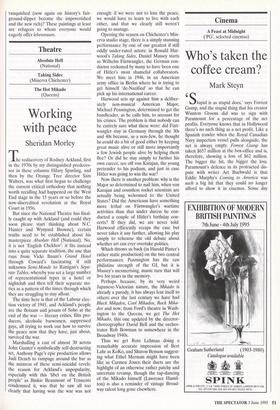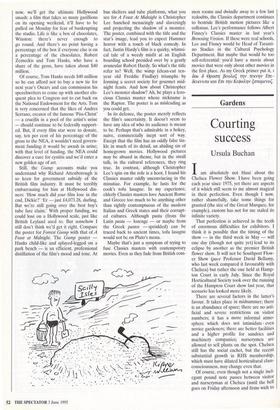Cinema
A Feast at Midnight (`PO', selected cinemas)
Who's taken the coffee cream?
Mark Steyn
S. tupid is as stupid does,' says Forrest Gump, and the stupid thing that his creator Winston Groom did was to sign with Paramount for a percentage of the net profits. Everyone knows that in Hollywood there's no such thing as a net profit. Like a Spanish trawler when the Royal Canadian Navy inspection vessel pulls alongside, the net is always empty. Forrest Gump has taken $657 million at the box-office and is, therefore, showing a loss of $62 million. The bigger the hit, the bigger the loss. Paramount's defence in its protracted dis- pute with writer Art Buchwald is that Eddie Murphy's Coming to America was such a big hit that they could no longer afford to show it in cinemas. Some day now, we'll get the ultimate Hollywood smash: a film that takes so many gazillions on its opening weekend, it'll have to be pulled on Monday for fear of bankrupting the studio. Life is like a box of chocolates, Winston: there's never enough to go round. And there's no point having a percentage of the box if everyone else is on a percentage of the chocolates. Robert Zemeckis and Tom Hanks, who have a share of the gross, have taken about $40 million.
Of course, Tom Hanks needs $40 million so he can afford not to buy a new tie for next year's Oscars and can commission his speechwriters to come up with another elo- quent plea to Congress not to cut back on the National Endowment for the Arts. Tom is very concerned that the likes of Andres Serrano, creator of the famous `Piss-Christ' — a crucifix in a pool of the artist's urine — should continue to be federally support- ed. But, if every film star were to donate, say, ten per cent of his percentage of the gross to the NEA, it wouldn't need govern- ment funding: it would be awash in urine; with that level of funding, the NEA could discover a cure for cystitis and we'd enter a new golden age of art.
Still, the Gump accounts make you understand why Richard Attenborough is so keen for government subsidy of the British film industry. It must be terribly embarrassing for him at Hollywood din- ners: 'How much did your film lose in the end, Dickie?"Er — just £4,073.28, darling. But we're still going over the best boy's tube fare claim.' With proper funding, we could lose on a Hollywood scale, just like British Leyland used to. But somehow I still don't think we'd get it right. Compare the poster for Forrest Gump with that of A Feast at Midnight. The Gump poster Hanks child-like and splayed-legged on a park bench — is an efficient, professional distillation of the film's mood and tone. At bus shelters and tube platforms, what you see for A Feast At Midnight is Christopher Lee hunched menacingly and slaveringly and projecting the shadow of a monster. The poster, combined with the title and the star's image, lead you to expect Hammer horror with a touch of black comedy. In fact, Justin Hardy's film is a quirky, whimsi- cal tale of a weedy misfit at an English boarding school presided over by a gently avuncular Robert Hardy. So what's the title refer to? Well, the wimp (clean-cut ten- year old Freddie Findlay) triumphs by forming a secret society for gourmet mid- night feasts. And how about Christopher Lee's monster shadow? Ah, he plays a fero- cious Classics master whose nickname is the Raptor. The poster is as misleading as you could get.
In its defence, the poster merely reflects the film's uncertainty. It doesn't seem to have any idea of who its audience is meant to be. Perhaps that's admirable in a hokey, naïve, commercially inept sort of way. Except that the film has an oddly false tin- kle in much of its detail, an abiding sin of homegrown movies. Hollywood pictures may be absurd in theme, but in the small talk, in the cultural references, they ring true. In contrast, although Christopher Lee's spin on the role is a hoot, I found his Classics master oddly unconvincing in the minutiae. For example, he lusts for the cook's tofu lasagne. In my experience, elderly Classics masters love Ancient Rome and Greece too much to be anything other than rightly contemptuous of the modern Italian and Greek states and their corrupt- ed cultures. Although pasta (from the Latin pasta — lozenge — or maybe from the Greek pastos — sprinkled) can be traced back to ancient times, tofu lasagne would not be on Plato's menu.
Maybe that's just a symptom of trying to fuse Classics masters with contemporary movies. Even as they fade from British corn- mon rooms and dwindle away to a few last redoubts, the Classics department continues to bestride British motion pictures like a collossus. Lee's performance follows Albert Finney's Classics master in last year's Browning Version. If these were real schools, Lee and Finney would be Head of Taranti- no Studies in the Cultural Psychology Department. But maybe that would be too self-referential: you'd have a movie about movies that were only about other movies in the first place. As my Greek primer put it, t Sou S &poemq fiovA,(4 rriv permv Ext- Setxvvra teat Em viv Ke0a/Inv 4c7railevc4



































































 Previous page
Previous page